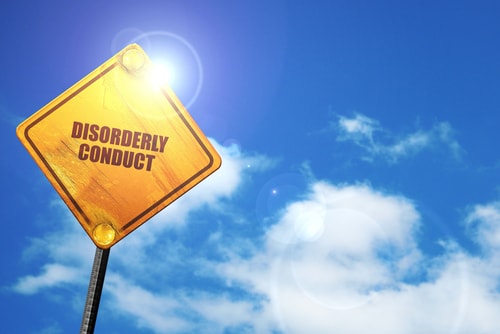Can Disorderly Conduct Lead to Criminal Charges in Illinois?
 There are many acts that can result in a criminal charge. For some offenses, physical harm or the threat of harm is involved, but that is not the case in other crimes. Many people have heard of the phrase “disorderly conduct,” but they may not know what exactly that entails. Some may think it is simply disturbing neighbors by playing loud music, yelling during a domestic argument, or revving a motorcycle or car engine.
There are many acts that can result in a criminal charge. For some offenses, physical harm or the threat of harm is involved, but that is not the case in other crimes. Many people have heard of the phrase “disorderly conduct,” but they may not know what exactly that entails. Some may think it is simply disturbing neighbors by playing loud music, yelling during a domestic argument, or revving a motorcycle or car engine.
Under Illinois law, disorderly conduct is a criminal charge that includes numerous actions or behaviors. The statute defines it as “an act in such unreasonable manner as to alarm or disturb another, to provoke a breach of the peace.” Disturbing the peace can result in criminal charges depending on the extent of the incident. It is important to know what actions constitute disorderly conduct in order to avoid an arrest and possible conviction.
What Actions Constitute Disorderly Conduct?
If police believe that certain behaviors cause enough of a disturbance, an officer may place someone under arrest for this offense. A few examples of disorderly conduct in Illinois include:
- Making a false report of a fire alarm
- Making a threat against a school
- Making a fake 911 call
- Entering another person’s property without permission/trespassing
- Invasion of privacy
- Falsely reporting abuse or neglect of a child
It is important to understand that these behaviors must be done knowingly or with intent to deceive. For example, it is not illegal to call 911 to report a fire because you smell or see smoke, even if the fire turns out to be a neighbor burning leaves. Likewise, reports of suspected abuse of a child must be made in good faith, not out of spite or an intent to harass the parents.
Misdemeanor and Felony Penalties
Disorderly conduct can result in misdemeanor or felony charges depending on the details of the incident. The punishments for a conviction on such charges range as follows:
- Class C misdemeanor: One month in jail or two years of probation and a $1,500 fine
- Class B misdemeanor: Six months in jail or two years of probation and a $1,500 fine
- Class A misdemeanor: One year in jail or two years of probation and a $2,500 fine
- Class 4 felony: Three years in jail and a fine up to $25,000
- Class 3 felony: Five years in jail and a fine of $3,000-$25,000
The challenge with disorderly conduct charges is that they can be somewhat subjective. Since the accusations are often based on a police officer’s opinion, many arrests are made without justification. Therefore, this can occur even if a person’s actions did not rise to the level of a criminal offense. It can often be up to the police officer’s discretion to decide whether a person’s behavior is simply annoying or irritating, or whether it constitutes criminal conduct.
Contact a Will County Criminal Defense Lawyer
Certain criminal acts are committed unintentionally. Disorderly conduct charges in Illinois can carry significant penalties depending on the circumstances of the incident. If you or someone you know is facing possible jail time or fines due to disorderly conduct, it is essential that you seek professional legal counsel as soon as possible to avoid a conviction. At McNamara Phelan McSteen, LLC, we use investigation, problem solving, and communication to defend you against criminal charges. Our exceptional Joliet criminal law attorneys will work tirelessly to protect your rights and your reputation. Call us today at 815-727-0100 to schedule your free consultation.
Source:
http://www.ilga.gov/legislation/ilcs/fulltext.asp?DocName=072000050K26-1
 815-727-0100
815-727-0100













